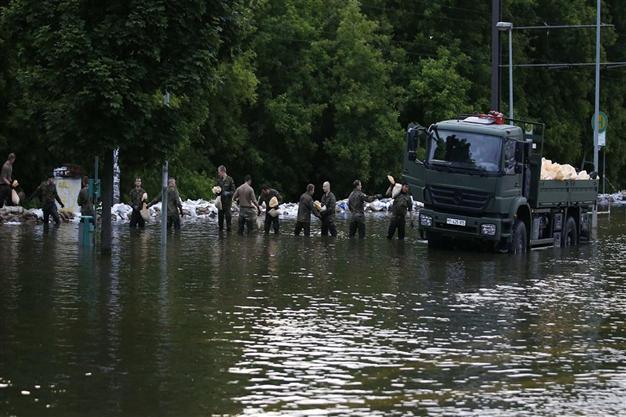Thousands of Germans evacuate as dam on Elbe river breaks
MAGDEBURG/GROSS ROSENBURG- Reuters

Members of the German armed forces Bundeswehr carry sandbags at a flooded street next to river Elbe at Rothensee district in the eastern German town of Magdeburg June 9, 2013. REUTERS/Tobias Schwarz
Thousands of people left their homes in eastern Germany on Sunday as a dam burst on the swollen River Elbe and swathes of farmland were flooded in an attempt to spare towns, with meteorologists forecasting more rain.In Magdeburg, one of the oldest cities in eastern Germany and a regional capital, some 23,000 people were asked to evacuate as water levels in the Elbe rose to a record 7.48 metres, around 5 metres above normal and surpassing the level reached in devastating floods in 2002.
"We helped yesterday to carry sandbags to secure the town. The mood is very depressed and frightened because many people have to leave their homes," said resident Liane Nagen.
There have been at least a dozen deaths as a result of floods that have hit Germany, Austria, Slovakia, Poland and the Czech Republic over the past week.
Officials said more than 8,000 people were evacuated by bus from towns and villages around Aken, south of Magdeburg. Some took their pets or farm animals with them.
A dam at the confluence of the River Elbe and the River Saale south of Magdeburg burst despite attempts to stabilise it. A dike was also breached, and a crisis unit said the high waters were likely to put further pressure on dikes in coming days.
Holger Stahlknecht, Interior Minister for the state of Saxony-Anhalt, where Magdeburg is located, said air and land surveillance would be stepped up in response to a threat from a previously unheard-of group calling itself the Germanophobic Flood Brigade to attack the sodden dikes.
More than 36,000 people were evacuated across Saxony-Anhalt. In Brandenburg, a largely rural state that surrounds the capital Berlin, some residents were evacuated and flooding of uninhabited areas was planned.
In Hungary, the Danube was also set to reach record levels in the capital Budapest on Sunday night and Prime Minister Viktor Orban said dikes had been strengthened at critical points to protect the city from flooding.
The deluge reached Hungary on Friday but so far authorities, soldiers and thousands of volunteers have managed to defend the villages and towns along the Danube, piling more than three million sandbags beside its dikes.
Carmaker Suzuki, one of Hungary's main exporters, said it would will halt production at its plant in Esztergom, north of Budapest, on Monday because of the floods.
German election factor
The damage from the floods in Germany could amount to more than 6 billion euros ($7.93 billion), according to the Cologne Institute for Economic Research.
Chancellor Angela Merkel, who faces an election in September, has promised 100 million euros ($130 million) in aid for flooded areas.
"We'll do everything humanly possible when it comes to reconstruction. Germany is sticking together in an admirable way at the moment and it should stay like that," she said.
She has been seen visiting flooded regions and speaking to victims and helpers, unlike her Social Democrat (SPD) challenger Peer Steinbrueck, who told German state television on Sunday he would not get involved in a "rubber boot competition".
"When the worst is over, I'd like to sit down with those affected and discuss in concrete terms what kind of help we can give," he said, adding that he wanted to create an ombudsman to coordinate aid for the victims of flooding.
The pair's response to the flooding could affect their respective chances in the election on Sept. 22. During the floods of 2002, decisive crisis management by SPD Chancellor Gerhard Schroeder gave him a boost in the polls which helped him win a second term.
Along with citizens and emergency services, around 11,000 German soldiers were helping fight the flood waters on Sunday. The situation in cities like Dresden and Halle and in the state of Bavaria had improved. ($1 = 0.7564 euros)
















